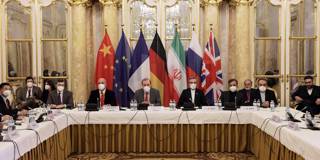The risk that the United Nations will reimpose the economic sanctions on Iran that were ended by the 2015 nuclear deal hangs over the presidency of hardliner Ebrahim Raisi like a sword of Damocles. This threat may be Raisi’s strongest incentive to reach a compromise in the ongoing nuclear talks.
BLACKSBURG, VIRGINIA – In a qualifying match last November for the 2022 soccer World Cup, Iran trailed Lebanon 0-1 at the end of the scheduled 90 minutes. On social media, skeptical Iranians were getting ready to blame their team’s imminent defeat on Iran’s hardline leaders, who supposedly wanted to lose the match in order to please Iran’s Lebanese proxy, Hezbollah. But, in the four minutes of stoppage time, Iran scored two goals to secure victory.

BLACKSBURG, VIRGINIA – In a qualifying match last November for the 2022 soccer World Cup, Iran trailed Lebanon 0-1 at the end of the scheduled 90 minutes. On social media, skeptical Iranians were getting ready to blame their team’s imminent defeat on Iran’s hardline leaders, who supposedly wanted to lose the match in order to please Iran’s Lebanese proxy, Hezbollah. But, in the four minutes of stoppage time, Iran scored two goals to secure victory.